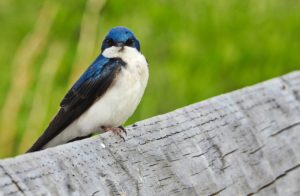Net benefit of birds increases on organic farms surrounded by more natural habitat
 Photo Credit: Ron Dauphin
Photo Credit: Ron Dauphin
Certified organic farms are required to support biodiversity, which in return provides important services back to the farm and improves crop yields. A study recently published in the journal Ecological Applications found that the benefit of biodiversity like birds is enhanced on organic farms when there is a lot of natural habitat surrounding the farm.
The presence of birds on farms can cause tension. While birds are often beneficial and provide natural pest control, they can also be pests themselves when they eat the crops, and some fear birds are vectors of foodborne pathogens. This study quantified the net benefit of birds in organic strawberry fields by considering their contributions to natural pest control, the damage they cause by eating crops, and the food safety risk potential from fecal contamination in the fields. They found that the pros and cons of birds largely depended on the amount of semi-natural habitat surrounding the farm. When there is more habitat in the landscape, the net benefit of birds increases. It is important to note that while birds did cause up to 3.6% reduction in yield by eating strawberries, this was very minor compared to damage by the most dominant insect pest (Lygus hesperus) that caused over 30% yield loss, indicating the importance of any pest control that birds could provide.
The farmers in this study expressed a deep commitment to providing safe food to consumers. Because strawberries are harvested by hand, any berries with contamination are identified and culled. Despite farmer concern for birds vectoring foodborne pathogens, the study found that fecal contamination of berries was extremely rare at only 0.01%. Contamination was not affected by vegetation on and around the farm, but instead by the amount of fencing on the farm. More fencing allowed for more bird perching and therefore more contamination. Overall, this study shows that maintaining more natural habitat around farms can increase the net benefits of birds without increasing food safety risks.


